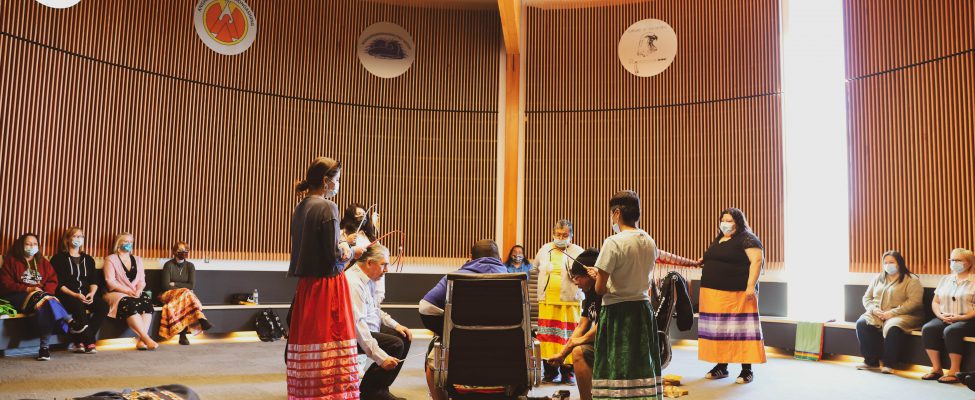According to Anishinaabe protocol, certain beings help us throughout our lives. These include sacred items, our helpers, our clans, and the spirit names we carry. Just like humans, our sacred items and helpers need to be feasted. We feast these items at least twice a year, once in the Spring and once in the Fall. SGEI typically hosts its Spring feasting ceremony at its Fort Frances and Kenora campuses soon after the trees begin to bud in mid-April.
Sacred items
Seven Generations Education Institute, like many Indigenous organizations, is guided by a Grandfather drum (Saagajiwe) and Grandmother eagle staff (Gookomisinaan). Asemaa (tobacco) was given during a jiisakaan (shaking tent) ceremony on July 31, 2007 to inquire if SGEI was ready to carry them. “We have been waiting,” the spirits shared. At this ceremony, the construction, naming, and accompanying sacred items were determined.
Ceremony preparation
To prepare for a feasting ceremony, quite a bit of planning needs to happen. Tobacco needs to be passed to the person officiating, typically an Elder or knowledgeable person, who conducts the ceremony in Anishinaabemowin. Small birch bark spirit dishes are made for the drum and staff and any other items/people being feasted. Tobacco is given to the drummers, women staff holders, and a grandmother who holds our Grandmother staff.
Two blankets placed in the room or space where the ceremony takes place. One is set aside for sacred items (regalia, pipes, shakers, ribbon skirts) and anything that needs to be feasted and the other is a gifting blanket. Gifts from ceremony attendees are placed on this blanket and given to a community or a family in need.
Pipe and Saagajiwe Songs
Everyone in attendance, the sacred items, the food and gifts are smudged before the ceremony begins. When the drum, staff, items, and attendants are ready, several men from SGEI’s ten governing First Nations sit and sound the drum, signaling the start of the ceremony. Behind them stand four women from our ten governing First Nations to hold the small Ogichidaakwe staffs, and a grandmother typically holds the Grandmother Eagle Staff to the East. The person officiating (a pipe carrier) explains the ceremony process and intentions.
The drummers perform the pipe song while the Ogichidaakwe hold the staffs high and the pipe carrier lights SGEI’s pipe, asking the spirits to support the drum, staff, sacred items, students, employees, building and grounds. During SGEI’s Saagjiwe, or drum song, the Ogichidaakwe and Elder raise their staffs and ceremony attendees walk clockwise around the drum. Any ceremony attendees who need to move around the room for any reason must walk clockwise around the drum.
Feasting
Cups or small plates are distributed to everyone along with food and water. Natural and nutritious foods like berries, deer or fish are passed around for everyone to consume on behalf of their helpers. We share this food with the spirits by placing a small amount in the birch bark spirit dishes and setting them outside following the ceremony for the spirits to collect.
Offering tobacco and tying the gift blanket
The drummers play a song of appreciation called the Miigwech song. Attendees are asked to present the sacred items with tobacco in three places – in the red cloth bag on the west of the drum, in a birchbark tray holding two Grandfather Stones, and in a wooden dish at the base of the Grandmother Eagle Staff. Over (at most) a six-month period of time, people have offered tobacco in three places around the drum and staff at the SGEI campus as well and this will be added to the gifting blanket. This tobacco holds the thoughts, intentions, energy and prayers of those who have visited.
The tobacco is later collected in a tobacco tie and added to the gift blanket. Helpers tie the gift blanket together. The gift items will be distributed by the chosen community or family and the tobacco can be placed at the base of a tree or burned. To close the ceremony, the drummers play the traveling song which asks for safe travels for everyone there.
Anishinaabemowin that goes along with spring ceremony
Want to follow along the next time you’re at a ceremony? Try using these common Anishinaabemowin phrases.
Wiikondiwin. A feasting.
Wiikondiyens. A spirit dish.
Zaka’ipwaagane. He/she is lighting a pipe.
Bagijige. He/she making an offering.
Nagamowag. They are singing.
Odaapinimawishin wa’awe asemaa. Please accept this tobacco from me.
Odaapinan owe miijim. Please accept this food.
Minopogwad owe miijim. This food tastes good.
SGEI sacred items are here to support
Any SGEI staff, visitor or student is welcome to visit our Grandfather drum, Saagajiwe, to sit with for support visit, offer tobacco and/or pray with. He sits in our circle room at our Fort Frances campus with our Grandmother Eagle Staff, Gookomisinaan. To learn more or request a visit with the drum from another campus, contact SGEI’s drumkeeper at (807) 274-2796.
